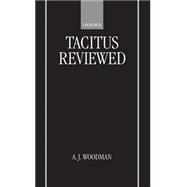Tacitus Reviewed
, by Woodman, A. J.- ISBN: 9780198152583 | 0198152582
- Cover: Hardcover
- Copyright: 12/31/1998
Tacitus, writing early in the second century AD, is acknowledged to be ancient Rome's greatest historian; his Annals, describing the emperors from Tiberius to Nero (AD 14 - 68), is his greatest work. This book gathers together Professor Woodman's writings on Tacitus over the past twenty-fiveyears, focusing almost exclusively on the AnnalsR. He starts from, and argues for, the basic premiss that, as a historian, Tacitus must be seen in ancient rather than in modern terms. The Annals is a literary text of immense subtlety and acknowledged difficulty and complexity; it is also a very familiar text, read and reread by generations ofscholars who want to find out about the Roman empire. One of Professor Woodman's principal contentions is that, through familiarity, these readers have misread significant passages of the text, thereby gaining and perpetuating a distorted view of what Tacitus has to say, especially about Tiberius.This distorted view is revealed, and the true meaning disclosed, by minute and detailed literary analysis. The author offers radically new or different interpretations of some of the most famous passages: the murder of Agrippa Postumus, the notorious accession debate of Tiberius, Tacitus' statement of the so-called 'highest function of history', Tiberius' obituary, Nero's debauched water-borne party,and the Pisonian conspiracy against Nero in AD 65. There is also discussion of major narrative sections of Books 1 and 4, concentrating on such matters as structure, vivid representation, imitation and allusion, and dramatic and generic manipulation of the narrative. The new interpretations have profound implications for those who wish to use Tacitus' Annals as a source for what happened in the first century AD.






